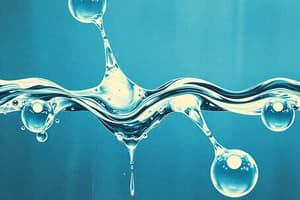Podcast
Questions and Answers
What unique property of water allows it to absorb a significant amount of heat before its temperature changes?
What unique property of water allows it to absorb a significant amount of heat before its temperature changes?
- High heat of vaporization
- Adhesion
- Cohesion
- High specific heat (correct)
Hydrophobic compounds are typically polar and attract water.
Hydrophobic compounds are typically polar and attract water.
False (B)
What are the elements represented by the acronym CHONPS?
What are the elements represented by the acronym CHONPS?
Carbon, Hydrogen, Oxygen, Nitrogen, Phosphorus, Sulfur
Water is a __________ compound due to its uneven sharing of electrons between hydrogen and oxygen.
Water is a __________ compound due to its uneven sharing of electrons between hydrogen and oxygen.
Match the macromolecule with its corresponding elements:
Match the macromolecule with its corresponding elements:
What type of bond occurs when electrons are transferred from a metal to a nonmetal?
What type of bond occurs when electrons are transferred from a metal to a nonmetal?
Cohesion refers to water's ability to stick to other polar substances.
Cohesion refers to water's ability to stick to other polar substances.
What is dehydration synthesis used for?
What is dehydration synthesis used for?
What type of bond is formed between amino acids in proteins?
What type of bond is formed between amino acids in proteins?
DNA and RNA have the same sugar molecule.
DNA and RNA have the same sugar molecule.
What are the main components of the sugar-phosphate backbone in DNA?
What are the main components of the sugar-phosphate backbone in DNA?
The primary structure of a protein is determined by the sequence of _____ acids.
The primary structure of a protein is determined by the sequence of _____ acids.
What interactions are impacted by changes in pH and heat when it comes to DNA?
What interactions are impacted by changes in pH and heat when it comes to DNA?
Match the following terms with their correct descriptions:
Match the following terms with their correct descriptions:
The outer portion of a DNA double strand contains nitrogenous base pairs.
The outer portion of a DNA double strand contains nitrogenous base pairs.
Name two ways carbohydrate monomers can be joined.
Name two ways carbohydrate monomers can be joined.
What process involves the removal of -H from one monomer and -OH from another to form a bond?
What process involves the removal of -H from one monomer and -OH from another to form a bond?
Hydrolysis is the reverse of dehydration synthesis.
Hydrolysis is the reverse of dehydration synthesis.
What are the three components of nucleotides?
What are the three components of nucleotides?
_____________ are the monomers of proteins and consist of an amine group, carboxyl group, and an R-group.
_____________ are the monomers of proteins and consist of an amine group, carboxyl group, and an R-group.
Which of the following describes unsaturated lipids?
Which of the following describes unsaturated lipids?
Match the type of biological macromolecule to its monomer:
Match the type of biological macromolecule to its monomer:
Phospholipids are non-polar and do not have any polar sections.
Phospholipids are non-polar and do not have any polar sections.
What is the basic structure of a DNA molecule?
What is the basic structure of a DNA molecule?
Flashcards
What makes water a polar molecule?
What makes water a polar molecule?
Oxygen has a higher electronegativity, pulling electrons closer and creating a partial negative charge on oxygen and a partial positive charge on hydrogen.
What is hydrogen bonding?
What is hydrogen bonding?
A weak attraction between polar molecules that occurs when a slightly positive hydrogen atom from one molecule is attracted to a slightly negative atom (often oxygen or nitrogen) from another molecule.
What is ionic bonding?
What is ionic bonding?
A chemical bond that involves the transfer of electrons from a metal to a nonmetal, resulting in the formation of ions and a strong electrostatic attraction.
What is covalent bonding?
What is covalent bonding?
Signup and view all the flashcards
What makes a compound hydrophobic or hydrophilic?
What makes a compound hydrophobic or hydrophilic?
Signup and view all the flashcards
What are the six elements essential for life?
What are the six elements essential for life?
Signup and view all the flashcards
How do organisms obtain the six essential elements for life?
How do organisms obtain the six essential elements for life?
Signup and view all the flashcards
What macromolecules use each of the six essential elements?
What macromolecules use each of the six essential elements?
Signup and view all the flashcards
What is dehydration synthesis?
What is dehydration synthesis?
Signup and view all the flashcards
What is hydrolysis?
What is hydrolysis?
Signup and view all the flashcards
What are nucleotides?
What are nucleotides?
Signup and view all the flashcards
What are amino acids?
What are amino acids?
Signup and view all the flashcards
What are monosaccharides?
What are monosaccharides?
Signup and view all the flashcards
What are fatty acids?
What are fatty acids?
Signup and view all the flashcards
What does the term "anti-parallel" mean in relation to DNA?
What does the term "anti-parallel" mean in relation to DNA?
Signup and view all the flashcards
What are the base pairing rules in DNA?
What are the base pairing rules in DNA?
Signup and view all the flashcards
What is a peptide bond?
What is a peptide bond?
Signup and view all the flashcards
What is the primary structure of a protein?
What is the primary structure of a protein?
Signup and view all the flashcards
What is the secondary structure of a protein?
What is the secondary structure of a protein?
Signup and view all the flashcards
What is the tertiary structure of a protein?
What is the tertiary structure of a protein?
Signup and view all the flashcards
What is the quaternary structure of a protein?
What is the quaternary structure of a protein?
Signup and view all the flashcards
What is the structure of a DNA double helix?
What is the structure of a DNA double helix?
Signup and view all the flashcards
How does DNA differ from RNA?
How does DNA differ from RNA?
Signup and view all the flashcards
How do changes in temperature and pH affect DNA and protein structure?
How do changes in temperature and pH affect DNA and protein structure?
Signup and view all the flashcards
Study Notes
Topic 1.1: Structure of Water and Hydrogen Bonding
- Water is a polar molecule due to unequal electron sharing between oxygen and hydrogen atoms. Oxygen has a higher electronegativity, pulling electrons closer to itself and creating a partial negative charge, while hydrogen atoms have a partial positive charge.
- Hydrogen bonding is a weak interaction between polar molecules, involving the attraction between a partially positive hydrogen atom and a partially negative atom (e.g., oxygen) in another molecule.
- Ionic bonding involves the transfer of electrons between atoms, forming ions that are attracted to each other.
- Covalent bonding involves the sharing of electrons between atoms.
- Hydrophobic compounds are non-polar (e.g., hydrocarbons), while hydrophilic compounds are polar or ionic (e.g., water-soluble compounds).
- Water has unique properties due to hydrogen bonding: high specific heat, cohesion, adhesion, high heat of vaporization, more dense as a liquid at lower temperatures, evaporative cooling, and surface tension.
Topic 1.2: Elements of Life
- Essential elements for life are Carbon (C), Hydrogen (H), Oxygen (O), Nitrogen (N), Phosphorus (P), and Sulfur (S) (CHONPS).
- Organisms obtain these elements from various sources: Plants absorb from air, water, and soil; animals and fungi from food. Bacteria can vary in their absorption methods.
- Macromolecules use these elements in different ways.
- Carbohydrates contain Carbon, Hydrogen, and Oxygen (CHO).
- Lipids contain Carbon, Hydrogen, and Oxygen (CHO), with some containing Phosphorus (e.g., phospholipids).
- Proteins contain Carbon, Hydrogen, Oxygen, and Nitrogen (CHON), and sometimes Sulfur (CHONS).
- Nucleic acids contain Carbon, Hydrogen, Oxygen, Nitrogen, and Phosphorus (CHONP).
Studying That Suits You
Use AI to generate personalized quizzes and flashcards to suit your learning preferences.




